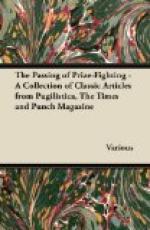The Skipper, picturesquely clad in boots (gum, high) and a goat’s skin, flung himself on the east wing, and became an animated buttress. Albert Edward climbed aloft and sat on the tin lid, which was opening and shutting at every pore. Mactavish put his shoulder to the south wall to keep it from working round to the north. I clung to the pantry, which was coming adrift from its parent stem, while William ran about everywhere, giving advice and falling over things. The mess passed rapidly through every style of architecture, from a Chinese pagoda to a Swiss chalet, and was on the point of confusing itself with a Spanish castle when the Heavies switched off their hate and went to bed. And not a second too soon. Another moment and I should have dropped the pantry, Albert Edward would have been sea-sick, and the Skipper would have let the east wing go west.
We pushed the mess back into shape, and went inside it for a peg of something and a consultation. Next evening William called on the Heavies’ commander and decoyed him up to dine. We regaled him with wassail and gramophone and explained the situation to him. The Lord of the Heavies, a charming fellow, nearly burst into tears when he heard of the ill he had unwittingly done us, and was led home by William at 1.30 A.M., swearing to withdraw his infernal machines, or beat them into ploughshares, the very next day. The very next night our mess, without any sort of preliminary warning, lost its balance, sat down with a crash, and lay littered about a quarter of an acre of ground. We all turned out and miserably surveyed the ruins. What had done it? We couldn’t guess. The field guns had gone to bye-bye, the Heavies had gone elsewhere. Hans, the Hun, couldn’t have made a mistake and shelled us? Never! It was a mystery; so we all lifted up our voices and wailed for William. He was Mess President; it was his fault, of course.
At that moment William hove out of the night, driving his tent before him by bashing it with a mallet.
According to William there was one, “Sunny Jim,” a morbid transport mule, inside the tent, providing the motive power. “Sunny Jim” had always been something of a somnambulist, and this time he had sleep-walked clean through our mess and on into William’s tent, where the mallet woke him up. He was then making the best of his way home to lines again, expedited by William and the mallet.
So now we are messless; now we crouch shivering in tents and talk lovingly of the good old times beneath our good old tin roof-tree, of the wonderful view of the mud we used to get from our window, and of the homely tune our shell-boxes used to perform as they jostled together of a stormy night.
And sometimes, as we crouch shivering in our tents, we hear a strange sound stealing up-hill from the lines. It is the mules laughing.
* * * * *
Songs of food production.




